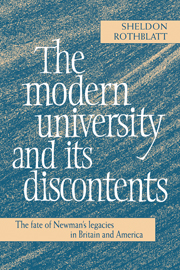Book contents
- Frontmatter
- Contents
- Preface
- 1 The idea of the idea of a university and its antithesis
- 2 ‘Consult the Genius of the Place’
- 3 ‘The first undergraduates, recognizable as such’
- 4 Failure
- 5 Historical and comparative remarks on the ‘federal principle’ in higher education
- Interlude: General introduction to Chapters six and seven
- 6 Supply and demand in the writing of university history since about 1790: 1. ‘The awkward interval’
- 7 Supply and demand in the writing of university history since about 1790: 2. The market and the University of London
- 8 Alternatives: 1. The importance of being unattached
- 9 Alternatives: 2. Born to have no rest
- Index
5 - Historical and comparative remarks on the ‘federal principle’ in higher education
Published online by Cambridge University Press: 02 December 2009
- Frontmatter
- Contents
- Preface
- 1 The idea of the idea of a university and its antithesis
- 2 ‘Consult the Genius of the Place’
- 3 ‘The first undergraduates, recognizable as such’
- 4 Failure
- 5 Historical and comparative remarks on the ‘federal principle’ in higher education
- Interlude: General introduction to Chapters six and seven
- 6 Supply and demand in the writing of university history since about 1790: 1. ‘The awkward interval’
- 7 Supply and demand in the writing of university history since about 1790: 2. The market and the University of London
- 8 Alternatives: 1. The importance of being unattached
- 9 Alternatives: 2. Born to have no rest
- Index
Summary
PROLEGOMENA: VANISHING IDENTITIES
Universities today arrive packaged in every conceivable shape and style. We should not be surprised. In its long and impressive history as a distinct institution within western civilisation, the university has never assumed a single form or followed a single pattern, nor, despite undeniable similarities in organisation and curriculum, has one university been a carbon copy of another. National differences of organisation, mission and curriculum have been plentiful; and within nations themselves numerous forms have coexisted.
This remains the situation, and if anything the variety of types has multiplied even more in the hospitable environments of our own century. In Austria and Germany many ‘universities’ of that designation are relatively specialised institutions, wirtschaftsuniversitäten or technische universitäten. Austria established a University of Mining at Leoben and a University of Educational Services at Klagenfurt. In the 1990s more than half of all French universities offered programmes of study confined to a limited range of specialties. In the fomer Soviet bloc, exclusively focused universities were established in conformity with communist government policy to concentrate on applied subjects. A University of Economics was established in Hungary in 1948, followed in the next year by a University of Heavy Industries and two years later by a University of Chemical Industry. In Stockholm, Lyngley (near Copenhagen), Paris, Lausanne, Zurich, Berlin, Vienna, London and Cambridge, Massachusetts, high-prestige engineering establishments have long flourished. They do not carry the hallowed name ‘university’, but this has not been a drawback.
- Type
- Chapter
- Information
- The Modern University and its DiscontentsThe Fate of Newman's Legacies in Britain and America, pp. 229 - 299Publisher: Cambridge University PressPrint publication year: 1997



